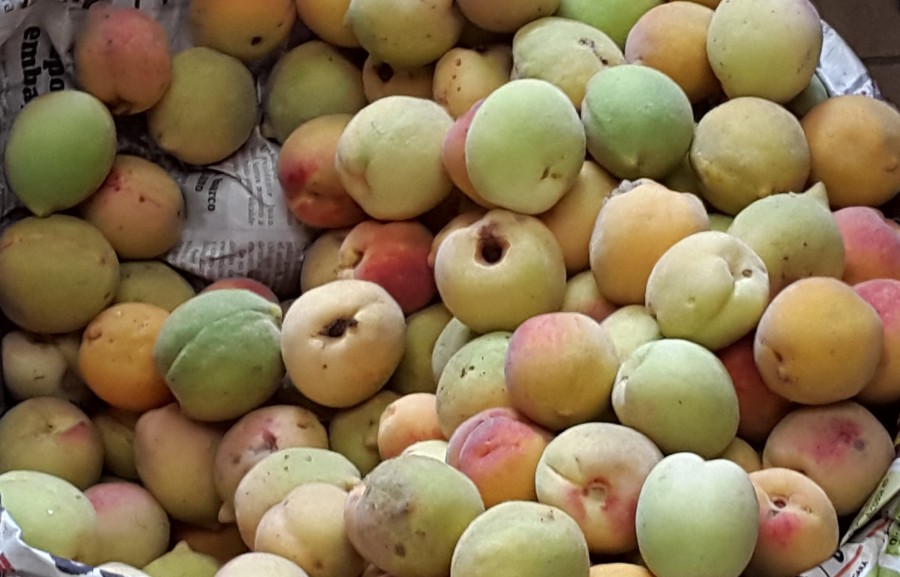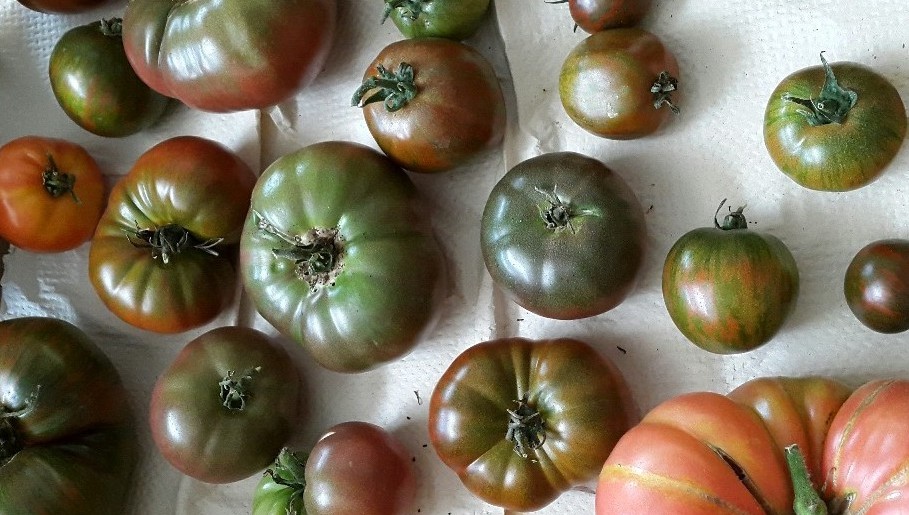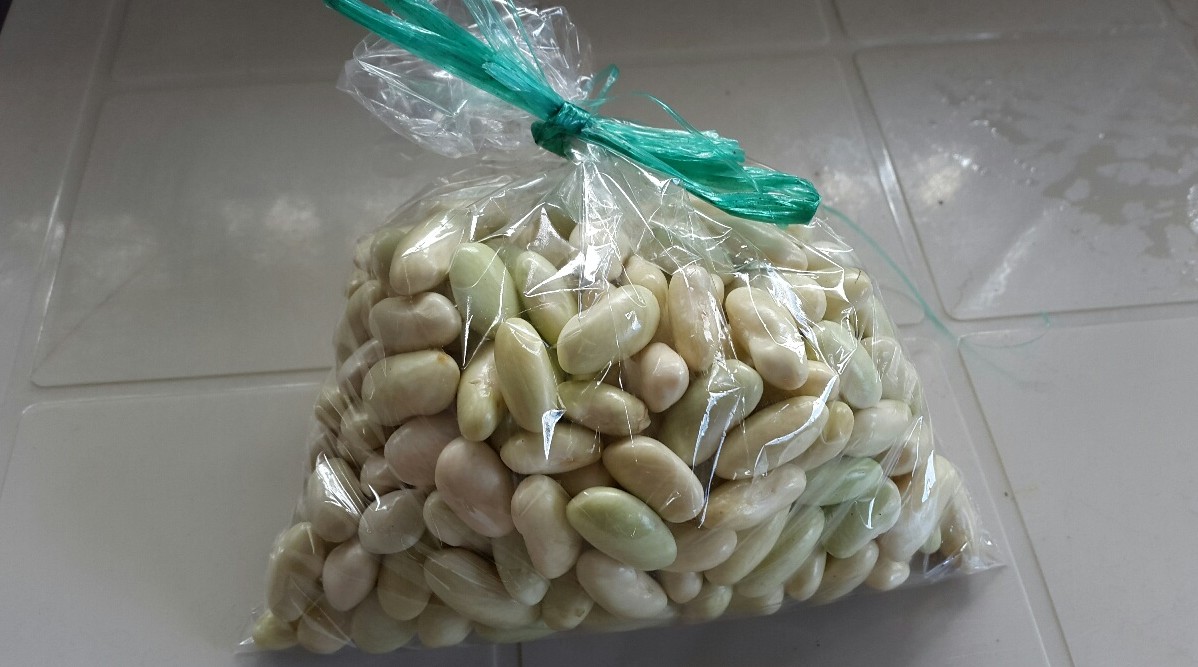 Although I often hear statements to the contrary, Ecuadoran Farming is almost entirely based on the use of petrochemicals. (Please understand this is not unique to Ecuador, it’s a world wide epidemic.) If you have any doubts to the validity of this statement, I suggest you go to any Agro store and look at the shelves upon shelves of petrochemicals that include chemicals to kill bugs (insecticides), chemicals to kill weeds (herbicides), chemicals to kill fungus (fungicides) and more, even some that have been banned in the U.S. and Europe. There is also heavy dependence on petrochemical based fertilizers. (When we asked at the biggest Agro Store in Cuenca if they had any products that could help organic growers, we were told “No, nada.”)
Although I often hear statements to the contrary, Ecuadoran Farming is almost entirely based on the use of petrochemicals. (Please understand this is not unique to Ecuador, it’s a world wide epidemic.) If you have any doubts to the validity of this statement, I suggest you go to any Agro store and look at the shelves upon shelves of petrochemicals that include chemicals to kill bugs (insecticides), chemicals to kill weeds (herbicides), chemicals to kill fungus (fungicides) and more, even some that have been banned in the U.S. and Europe. There is also heavy dependence on petrochemical based fertilizers. (When we asked at the biggest Agro Store in Cuenca if they had any products that could help organic growers, we were told “No, nada.”)
Now, I know what you’re thinking, “The farmer I know says his farm is organic and doesn’t use chemicals.” Well, if I had a nickel for every farmer who told me that story, and it wasn’t true, I’d have many jars full of nickles. In fact, I’m not sure I’ve been on a farm in Ecuador when I’ve asked the question, “Do you use chemicals on your farm?” that I don’t hear an emphatic denial. But after my friend and I talk with the farmer for a while and discuss certain pests and/or fungus, the truth (kind of) comes out. It is usually in the form of, “Well, we don’t use the really bad chemicals like the guys down the road.” Yeah, right…What we learned is that Ecuadorans, like almost all farmers everywhere, regularly use chemicals. They are not willing to risk losing their crops. So, if something bad starts to happen, they use chemicals. Unfortunately, that’s called, “Organic until there is a problem”, which is NOT organic at all.
When we did Farmer's Markets years ago, many sellers would claim that their products were organic. I used to investigate such claims and found none of these sellers to even know the organic directives. In general, in Ecuador, farmers farm and truckers truck. But you need a truck to get the products to market. So, the truckers are the ones that generally buy their products from a number of farms and then consolidate them and sell them at various venues having no idea what they are selling as their sources can vary from week to week. But, of course, they claim that all their products are fresh and organic, and naive buyers think they're getting a good deal when the products are neither fresh nor organic.
 Further, chemical use is only one aspect of organic farming. I would bet that there are very few farmers in Ecuador who even know (or care) about all of the parts of the organic directive that, for example, include rules pertaining to crop rotation. Have you noticed that you see the same crops (corn, rice, potatoes, camote, cabbage, yuca, etc.) planted in the same location year after year after year? (This practice fails the organic directive as it necessitates the use of MORE chemicals.) Do you really think you get good, healthy food this way? Or simply empty nutrient, belly stuffers sprayed to death.
Further, chemical use is only one aspect of organic farming. I would bet that there are very few farmers in Ecuador who even know (or care) about all of the parts of the organic directive that, for example, include rules pertaining to crop rotation. Have you noticed that you see the same crops (corn, rice, potatoes, camote, cabbage, yuca, etc.) planted in the same location year after year after year? (This practice fails the organic directive as it necessitates the use of MORE chemicals.) Do you really think you get good, healthy food this way? Or simply empty nutrient, belly stuffers sprayed to death.
Yet another aspect of good farming practices is in seed selection. Ecuadoran farmers use modern seed varieties that were developed after the 1950s. The farming world went through a big change during that time in its seed bank as the agriculture industry went from a local farming model to a warehouse/tractor-trailer global farming model that necessitated crops that could withstand the rigors of being shipped thousands of miles. The delicious fruit and vegetable varieties (now called heirlooms) were then replaced by durable varieties that were bland or tasteless. But man, they could survive a week on a 3000 mile trip and look like they were picked yesterday. Don’t always believe what your eyes think they see. Fruits and Vegetables need not only look good, but they need to be fresh and taste good too.
That brings us to harvesting. In Ecuador, and in most developing nations, harvesting is often done, not by the grower, but by a contract harvester who brings in lots of laborers and agrees to pay a certain amount per pound to the grower for his crop. The usual story is that the harvester’s laborers harvest EVERYTHING, from stuff very green to stuff that is rotting. It’s all just thrown together, boxed or bagged up and sold into the wholesale market. Do you think that's actually a good deal?
Finally, in Ecuador, how old is the food from the time it was picked to when it finally gets to you? This is a difficult question to answer in general as there are a lot of factors. There are often multiple days from the time the crop was picked and boxed or bagged until it is picked up from the farm by a truck. There are days for the truck to take it to a transfer point. There are days that it takes for it to get to its destination warehouse. From there it can be purchased and then put on sale to the wholesale buyers. If the vendor who buys it has previous stock, it will be held until the old stock is sold. If you can get a vendor to sell you new stock, you will pay a premium and who wants to do that if you're just selling it to someone else? All in all, it seems unlikely that most of your “fresh fruits and vegetables” are much less than a couple of weeks old and possibly a month or more. I’ve been told there are people and restaurants that can make “old food” taste good. That has not been my experience. But even so, what are you feeding your body? Ingredients matter!
In contrast, GRAN ROCA follows a rigorous four-step process in producing the mouthwatering-freshest, most delicious, GringoPost Award winning Fresh Fruits and special varieties of Vegetables with our GringoPost Award winning Fresh Tomatoes not available anywhere else.
 We use seeds from Heirloom Varieties for the Vegetables that we grow — the family favorites that have been passed down from generation to generation — producing the best textures and flavors for you and your family to enjoy.
We use seeds from Heirloom Varieties for the Vegetables that we grow — the family favorites that have been passed down from generation to generation — producing the best textures and flavors for you and your family to enjoy.
Everything we grow is Sustainably Grown. Our focus is on improving the soil as we farm. We add river silt and compost to our raised beds and employ crop rotation techniques that enhance the sustainability of our soil. And NO petrochemicals are used on our farm.
Our fruits and vegetables are Harvested Ripe (not some crappy under-ripe/over-ripe mix) giving our customers the best, most flavorful, most consistent eating experience possible.
Our Fruits and Vegetables are harvested Farm-to-Table fresh in the morning for our customers in the afternoon. What you put on your table is only a few hours old.
It is a lot harder, more risky, and a lot more time consuming, to farm this way, but the results speak for themselves; YOU CAN TASTE THE DIFFERENCE, and it’s NOT all that close. Fresh, clean, healthy, delicious food at the peak of its flavor is our passion! We want to share it with you...

